Asserts
You can assert what will be the behavior of executions:
| Assert | Value | Description |
|---|---|---|
| assertStdout | Boolean | Is output produced? |
| assertStdoutEqual | String | Is the output equal to the String? |
| assertStdoutNotEqual | String | Is the output different than the String? |
| assertStdoutContains | String | Does the output contain the String? |
| assertStdoutNotContains | String | Does the output not contain the String? |
| assertStdoutSHA256 | SHA256Checksum | Is the output equal to this SHA256 hash? |
| assertStdoutRegex | Regex | Does the output match your regular expression? |
| assertStdoutNotRegex | Regex | Does the output not match your regular expression? |
| assertStderr | Boolean | Are errors produced? |
| assertStderrEqual | String | Is the error equal to the String? |
| assertStderrNotEqual | String | Is the error different than the String? |
| assertStderrContains | String | Does the error contain the String? |
| assertStderrNotContains | String | Does the error not contain the String? |
| assertStderrSHA256 | SHA256Checksum | Is the error equal to this SHA256 hash? |
| assertStderrRegex | Regex | Does the error match your regular expression? |
| assertStderrNotRegex | Regex | Does the error not match your regular expression? |
| assertReturnCode | Integer | Is the return code equal to a certain value? |
| assertReturnCodeNot | Integer | Is the return code not equal to a certain value? |
| assertDifferent | Boolean | Does the execution behave differently when using different inputs? |
| assertKilled | Boolean | Did the software time out? |
General usage
Asserts are defined within tests:
HelloWorld:
assertStdoutContains: "Hello World"
echo:
- echo Hello WorldAnd they can have a severity associated, especially useful when working with ticketing systems:
HelloWorld:
assertStdoutContains: "Hello World"
setSeverity: 1
echo:
- echo Hello WorldYou can also define multiple strings that should much, such as the following case:
install:
- apt update
- apt install -qy curl
test:
assertStdoutContains:
- HTTP/2 200
- Satori CI
- info@satori-ci.com
- nonexistentstring
satori:
- curl -si https://satori.ciassertStdout
| Input | Description |
|---|---|
| Boolean | Asserts if an output has been produced |
- Example Pass Test: the program should deliver output, and it does:
test:
assertStdout: True
run:
- echo Hello World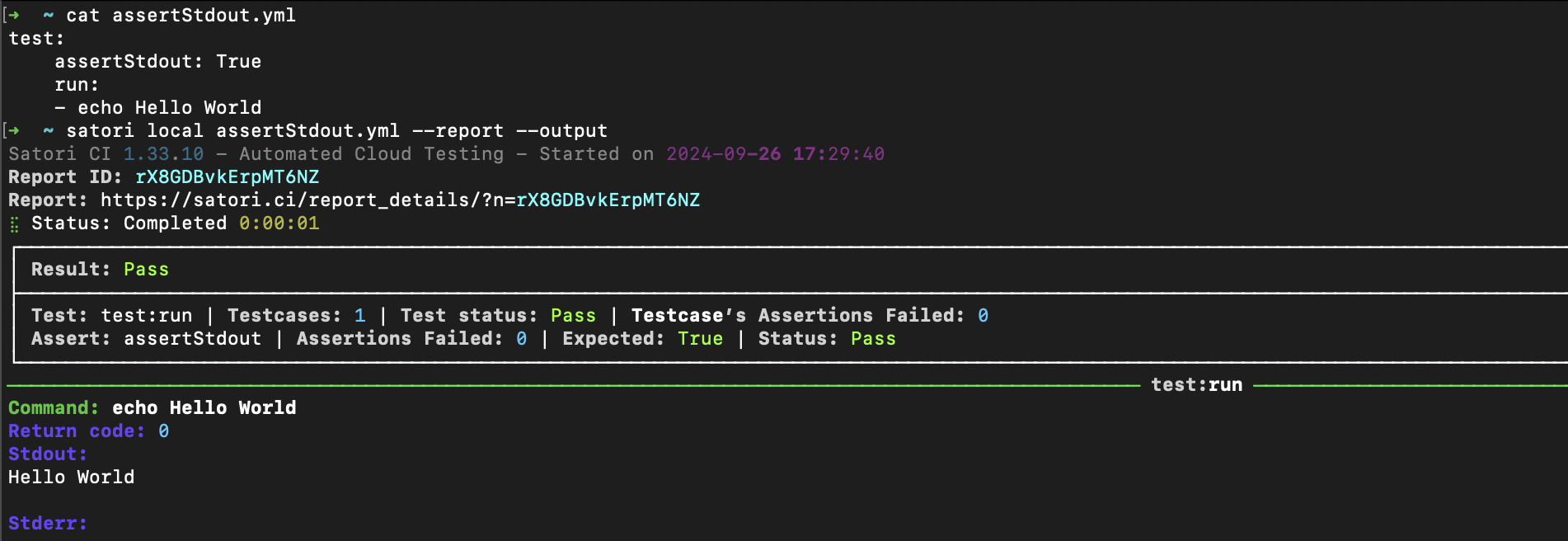
- Example Fail Test: the program should deliver output, but no output is produced:
test:
assertStdout: True
run:
- ./broken_executable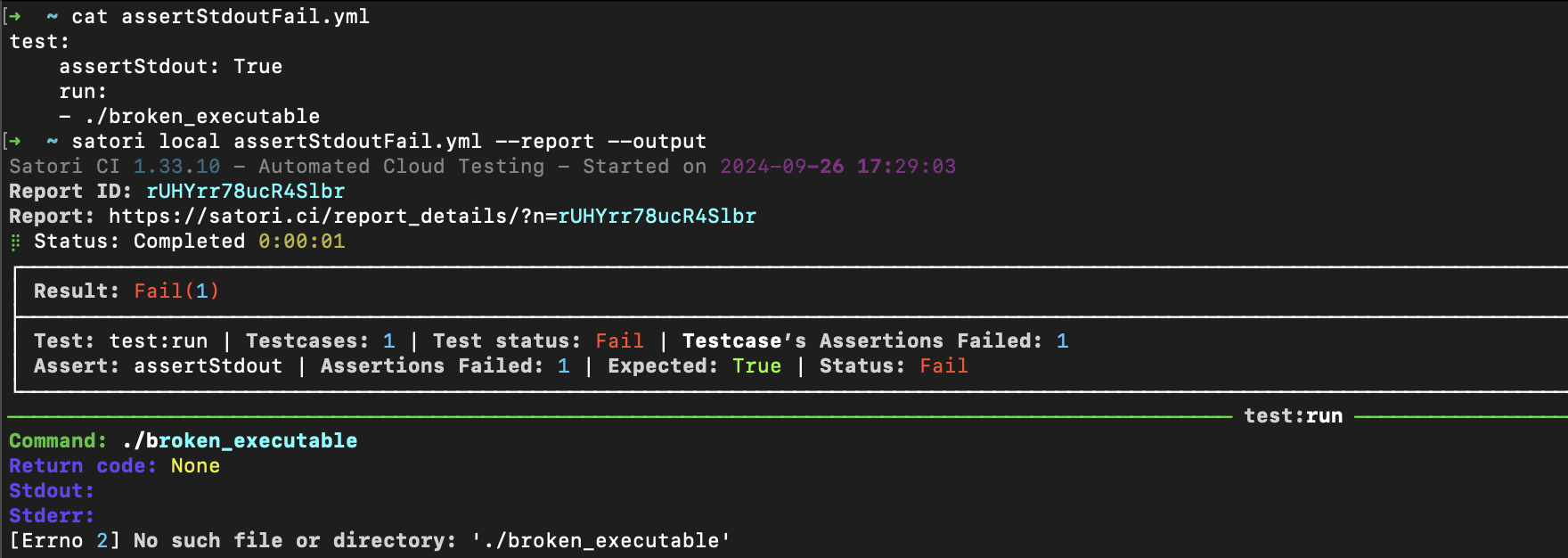
assertStdoutEqual
| Input | Description |
|---|---|
| String | Asserts that the output is equal to the String |
- Example Pass Test: the program should output "Hello World" and a newline, and it does:
test:
assertStdoutEqual: "Hello World\n"
run:
- echo Hello World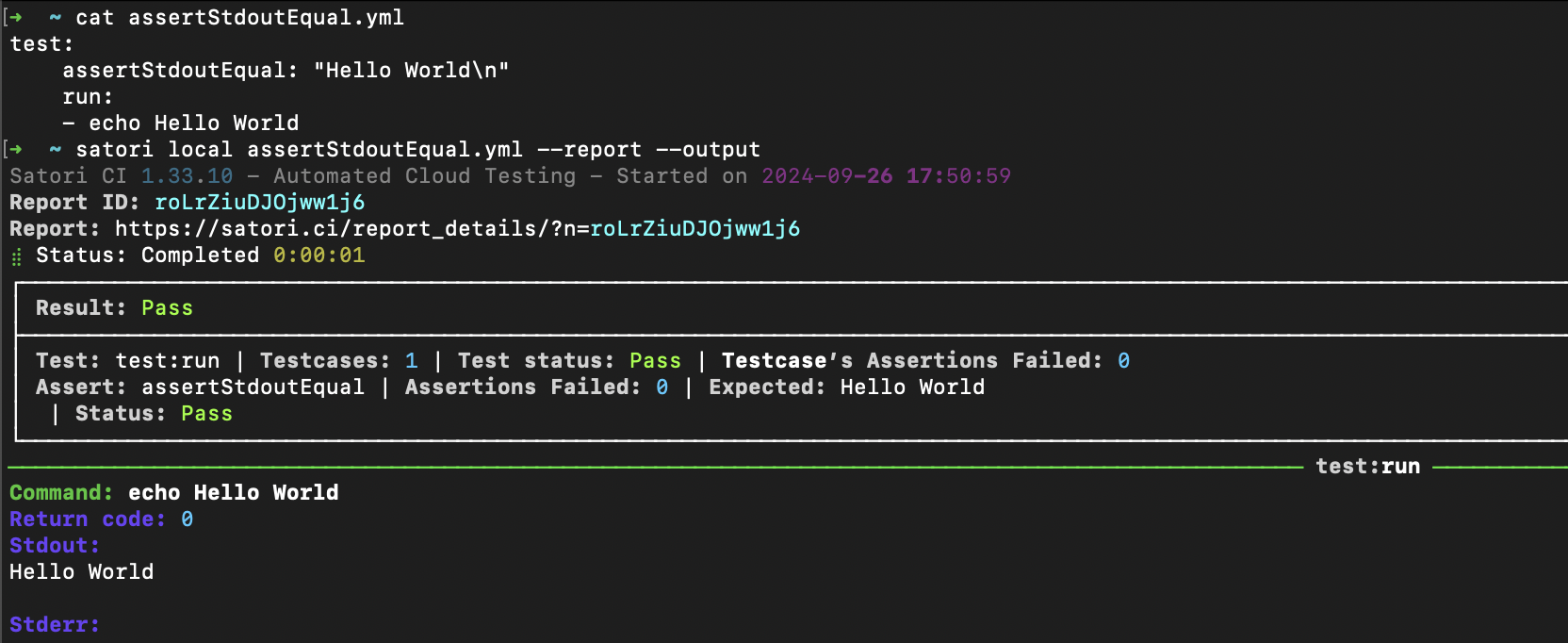
- Example Fail Test: the program should output "Hello World" and a newline, but it doesn't:
test:
assertStdoutEqual: "Hello World\n"
run:
- echo hello world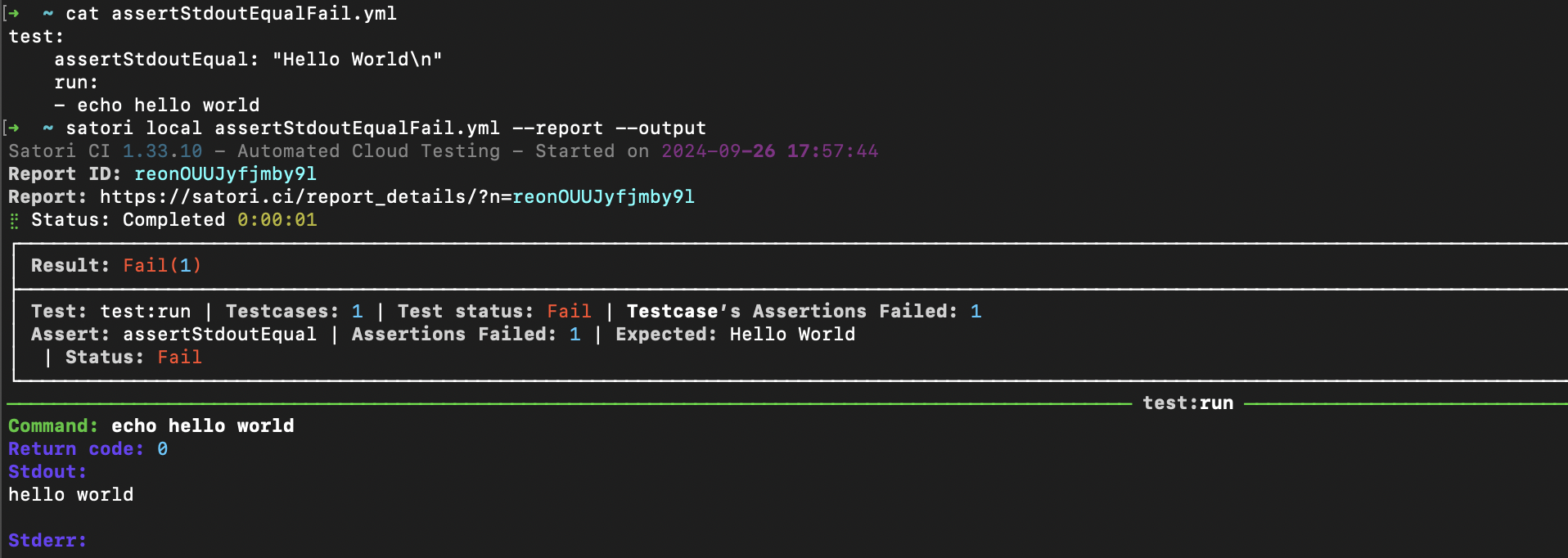
assertStdoutNotEqual
| Input | Description |
|---|---|
| String | Is the output different than String? |
- Example Pass Test: the program output should not be equal to "Hello World", and is not:
test:
assertStdoutNotEqual: "Hello World\n"
input:
- - value: "Hello World"
mutate: radamsa
mutate_qty: 1
run:
- echo ${{input}}Mutations output different inputs than the one originally provided. Read more about it on the Inputs section for Playbooks.
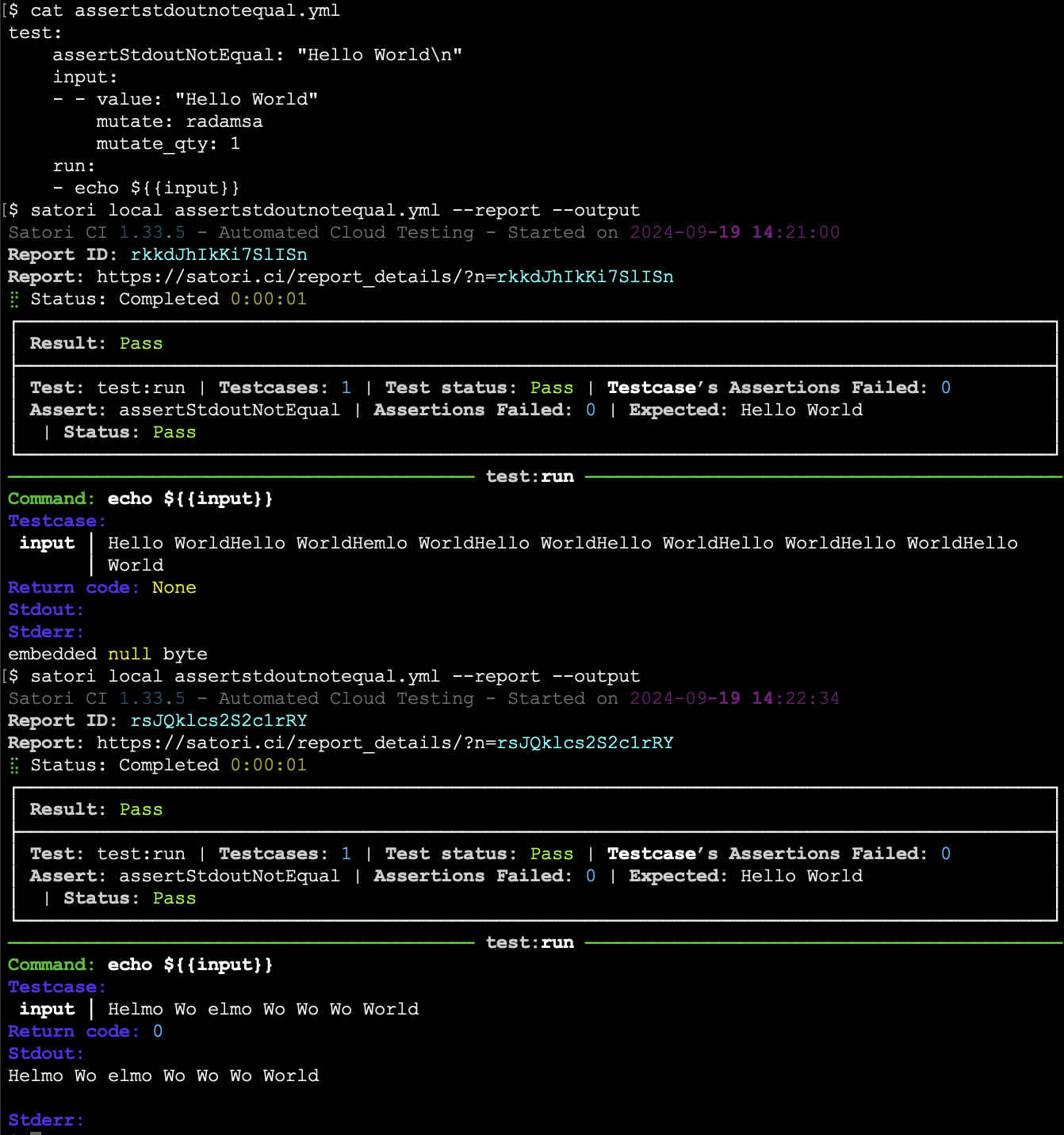
assertStdoutContains
| Input | Description |
|---|---|
| String | Does the output contain the String? |
- Example Pass Test: the program output should contain the string "Hello World", and it does:
test:
assertStdoutContains: "Hello World"
run:
- echo Hello World 2023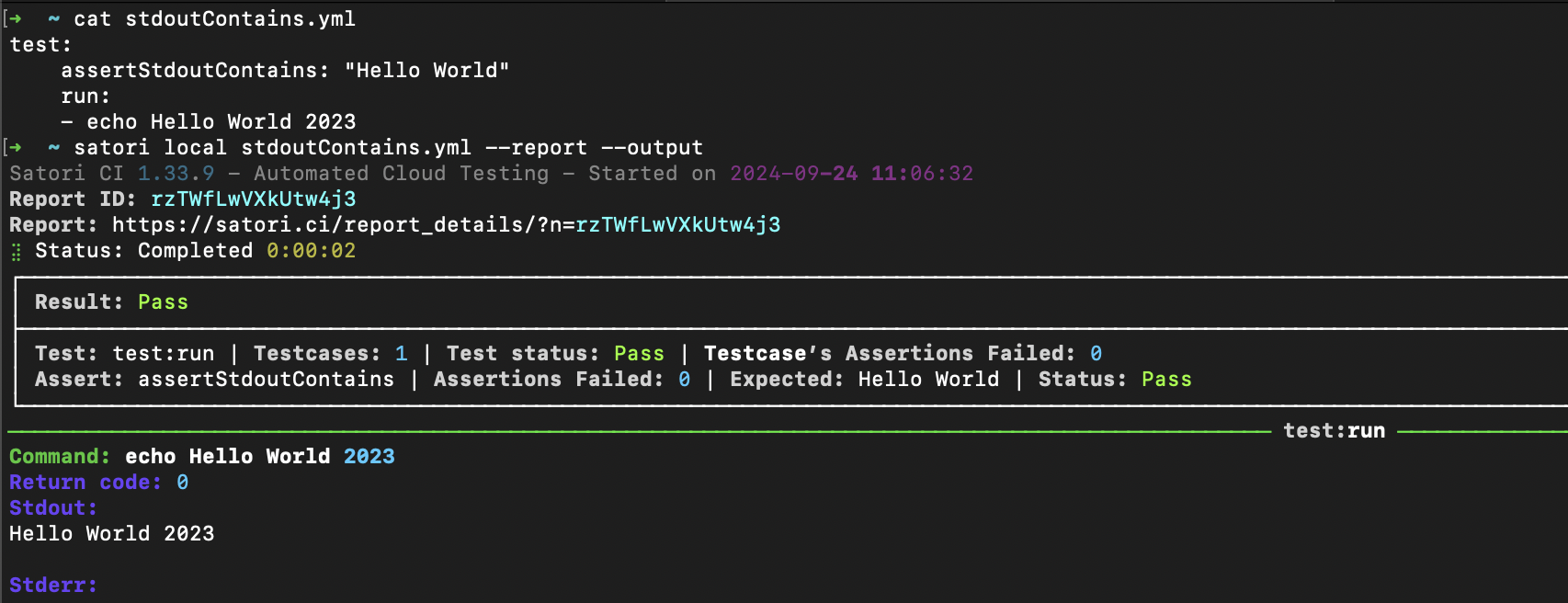
assertStdoutNotContains
| Input | Description |
|---|---|
| String | Does the output not contain the String? |
- Example Pass Test: the program output should not contain the string "Error", and it does not:
test:
assertStdoutNotContains: "Error"
run:
- echo Hello World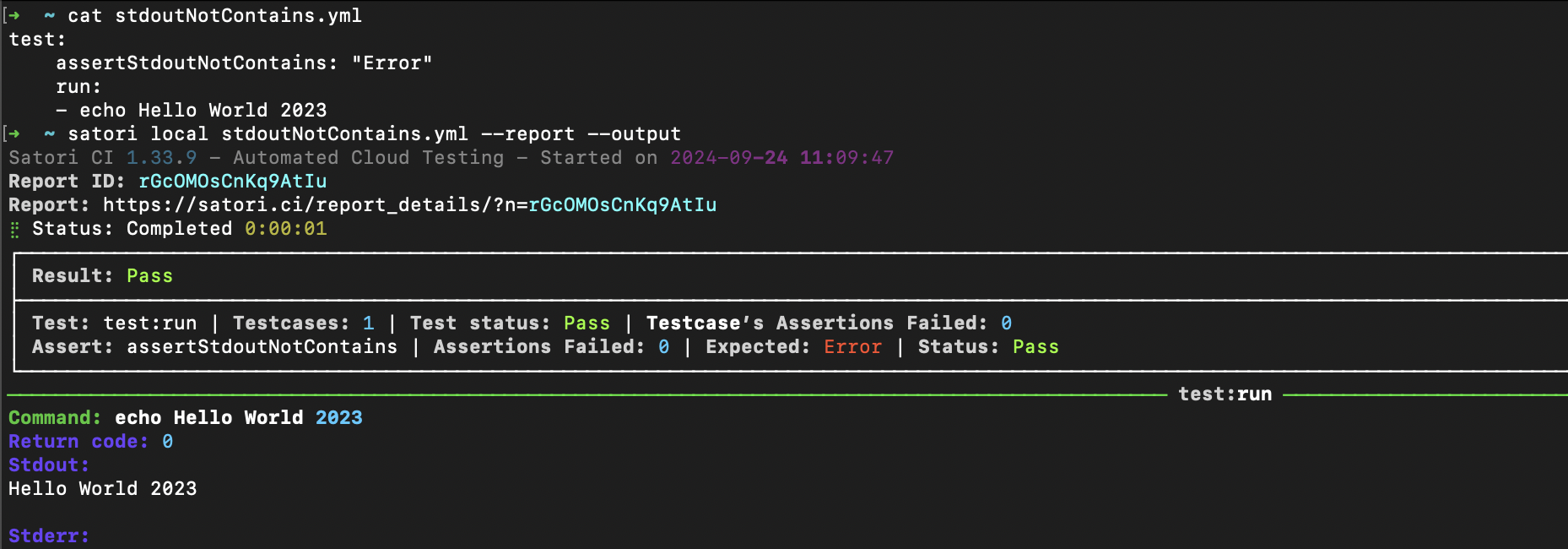
assertStdoutSHA256
| Input | Description |
|---|---|
| SHA256Checksum | Is the output equal to this SHA256 hash? |
- Example Pass Test: Google's root webpage hash has not changed:
If an output should be equal to a certain hash, to confirm that its original value has not changed, you can verify that with an assert. Consider for example how Google shows consistently the same SHA 256 hash:
$ curl -s https://google.com | shasum -a 256
5b61b0c2032b4aa9519d65cc98c6416c12415e02c7fbbaa1be5121dc75162edb -At the time of writing this, the hash 5b61b0c2032b4aa9519d65cc98c6416c12415e02c7fbbaa1be5121dc75162edb can be asserted programmatically:
You could assert that the output is consistent with that hash:
settings:
image: curlimages/curl:7.83.1
test:
assertStdoutSHA256: 5b61b0c2032b4aa9519d65cc98c6416c12415e02c7fbbaa1be5121dc75162edb
google:
- curl -s https://google.com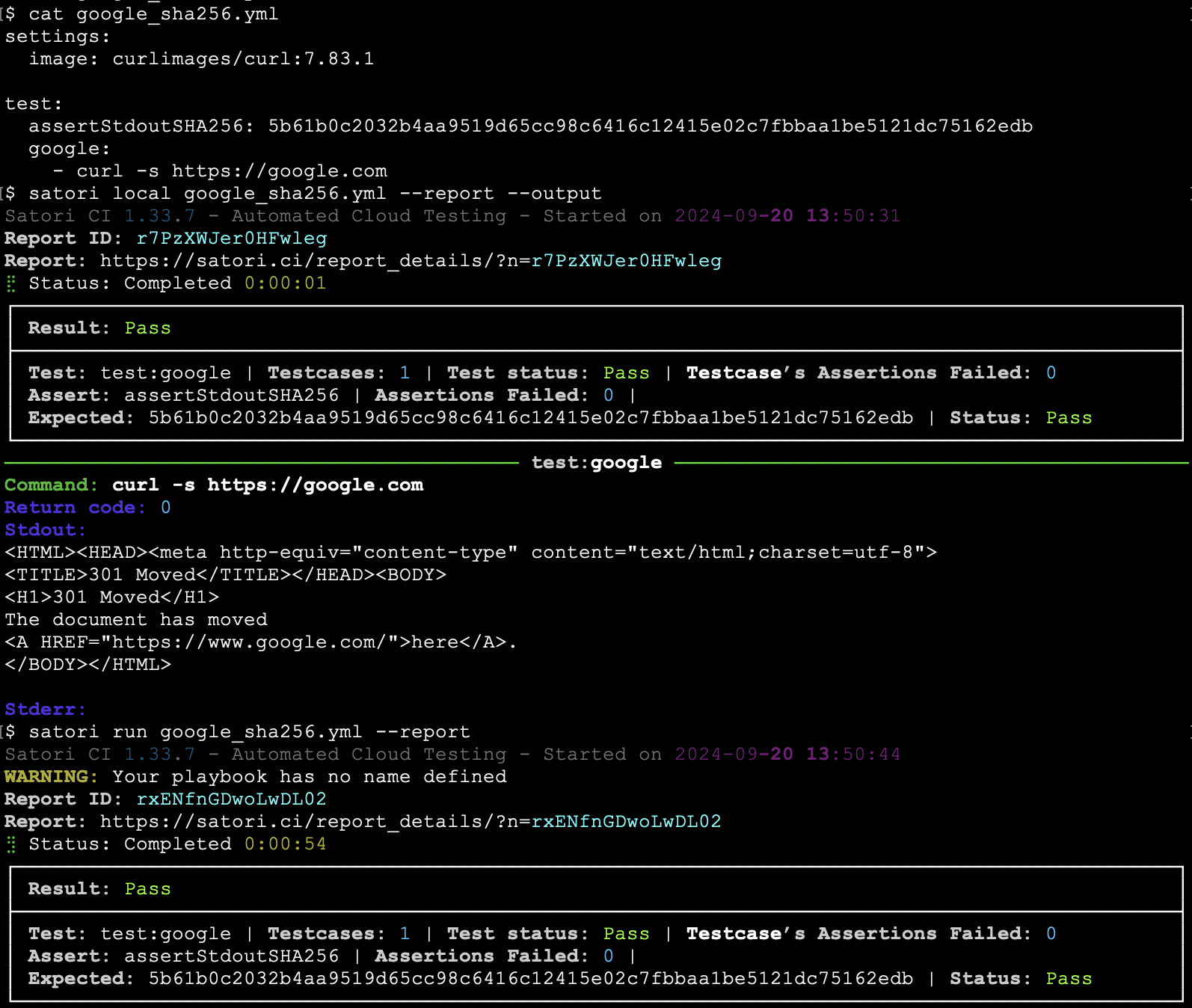
assertStdoutRegex
| Input | Description |
|---|---|
| Regex | Does the output match your regular expression? |
- Example Pass Test: the program output should contain the string "Hello " and additional characters, and it does:
test:
assertStdoutRegex: "Hello .*"
run:
- echo Hello World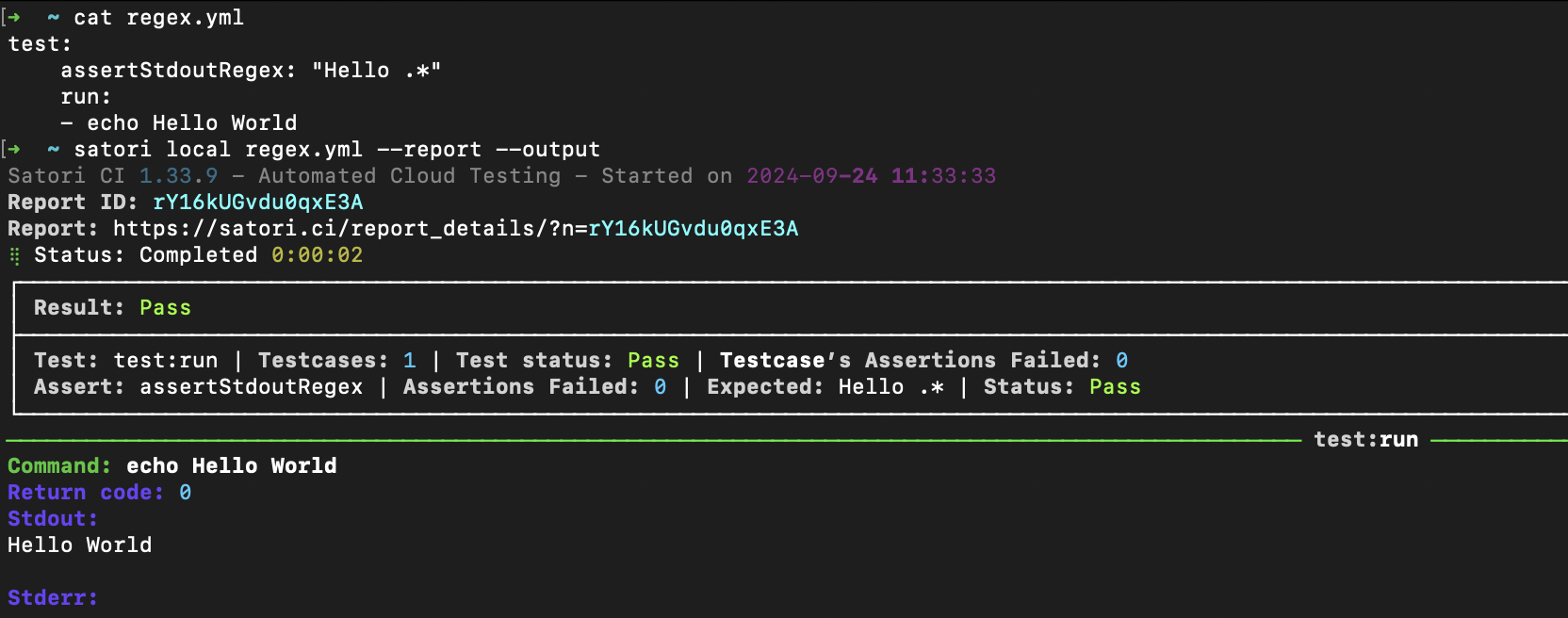
assertStdoutNotRegex
| Input | Description |
|---|---|
| Regex | Does the output not match your regular expression? |
- Example Unknown Test: the program output should not contain the string "Hello World" anywhere on the output, but the input could be mutated to "somethingHello World" and the result depends on the mutation:
test:
assertStdoutNotRegex: ".*Hello World.*"
input:
- - value: "Hello World"
mutate: radamsa
mutate_qty: 1
run:
- echo Hello ${{input}}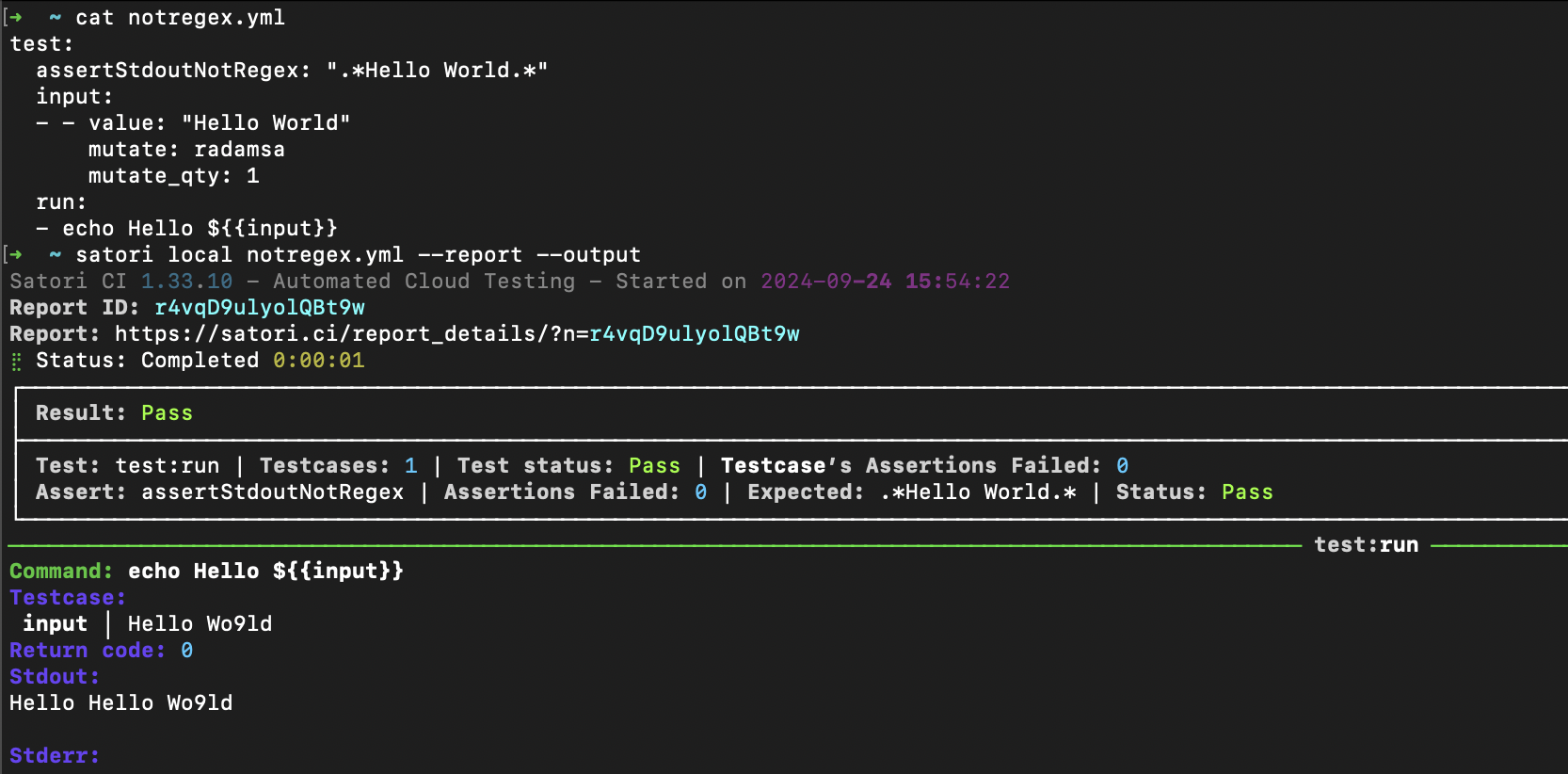
assertStderr
| Input | Description |
|---|---|
| Boolean | Are errors produced? |
- Example Pass Test: the program output should not output errors, and it does not:
test:
assertStderr: False
run:
- echo Hello World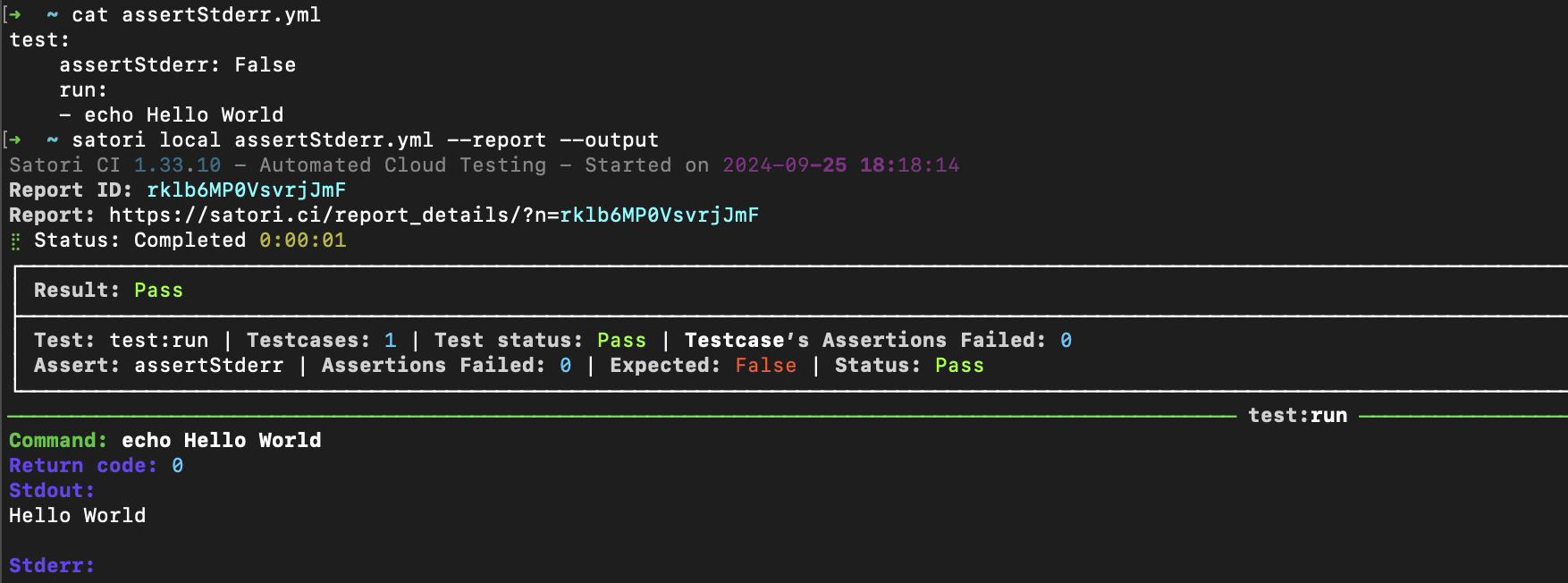
assertStderrEqual
| Input | Description |
|---|---|
| String* | Is the error equal to the String? |
- Example Pass Test: the programs should verify that the error is a certain string:
settings:
image: python
test:
assertStderrEqual: Verify this error
error:
- python3 -c "import sys; sys.stderr.write('Verify this error')"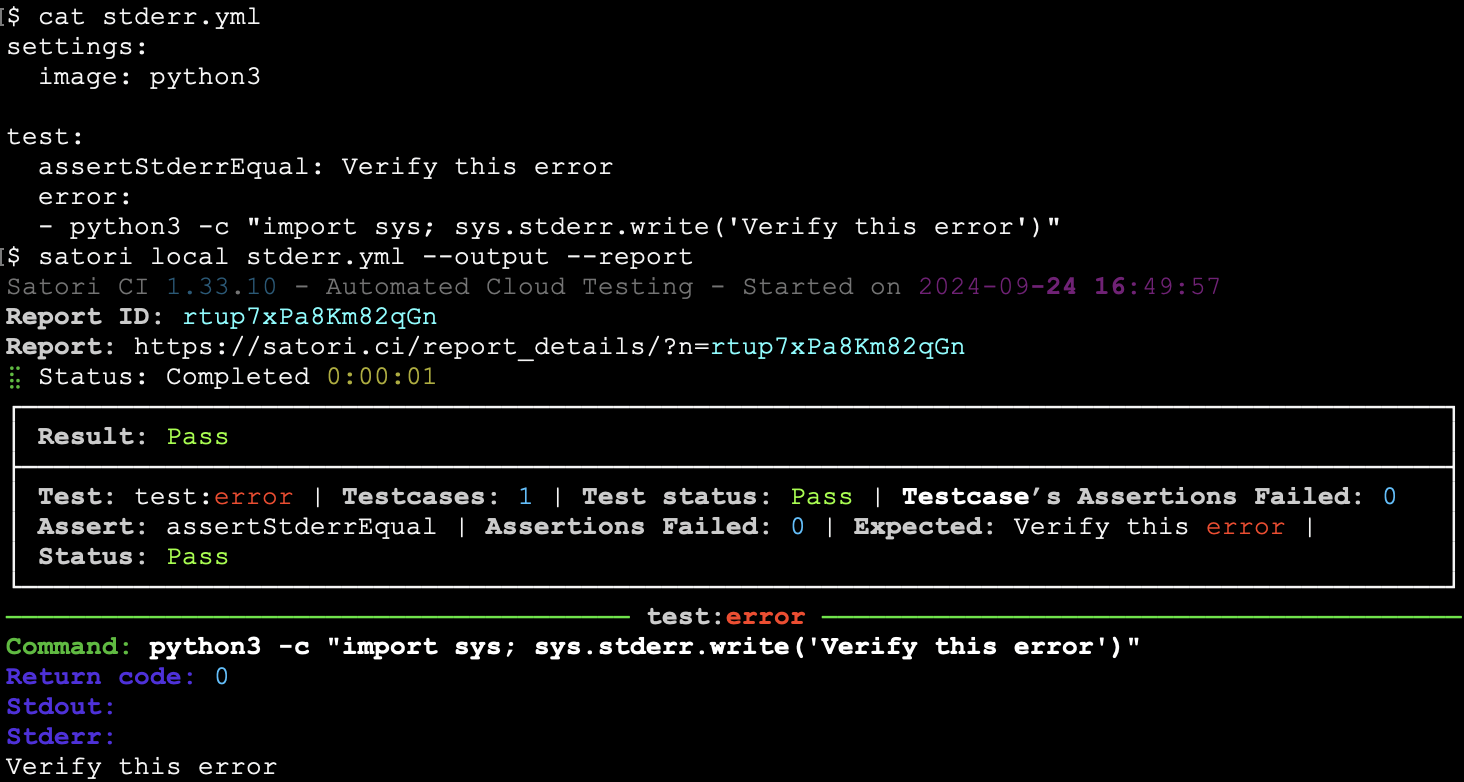
assertStderrNotEqual
| Input | Description |
|---|---|
| String | Is the error different than the String? |
- Example Fail Test: the programs should verify that the error is not a certain string:
settings:
image: python
test:
assertStderrNotEqual: Verify this error
error:
- python3 -c "import sys; sys.stderr.write('Verify this error')"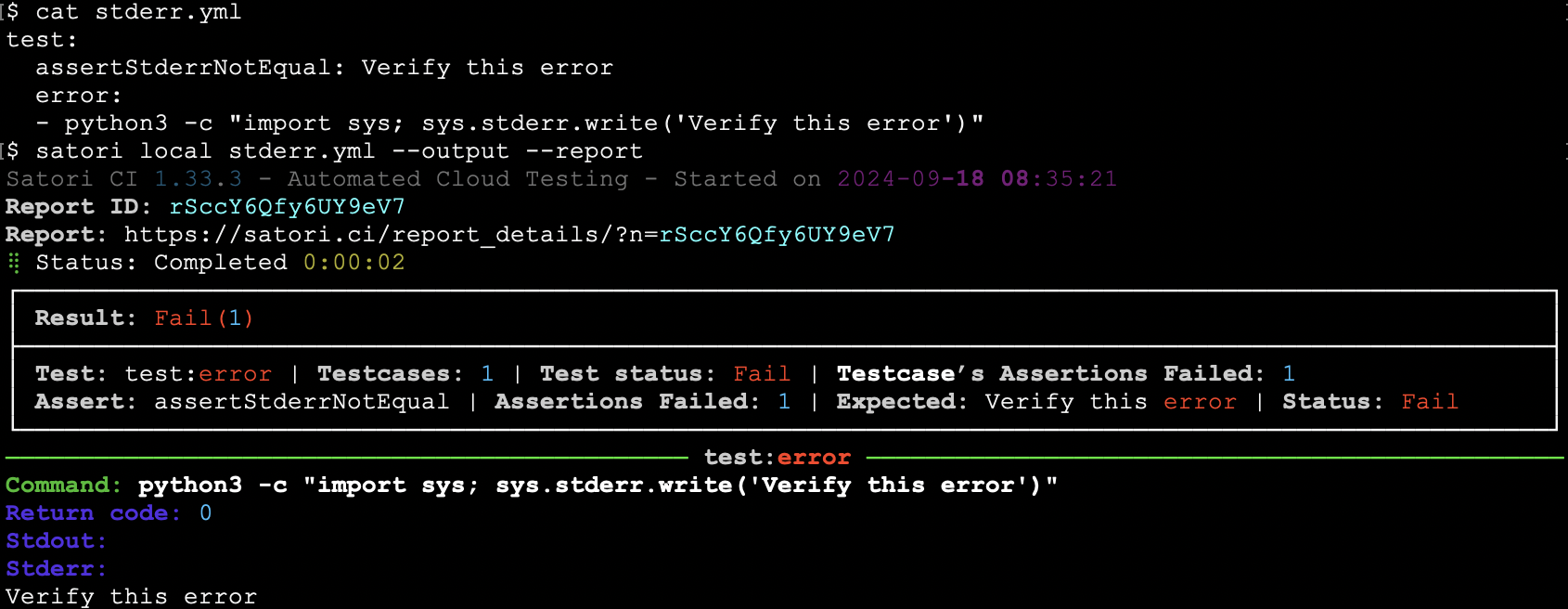
assertStderrContains
| Input | Description |
|---|---|
| String | Does the error contains the String? |
- Example Pass Test: the program's errors should contain the string Traceback, and it does:
settings:
image: python
install:
- echo import nonexistent > test.py
test:
assertStderrContains: "Traceback"
run:
- python3 test.py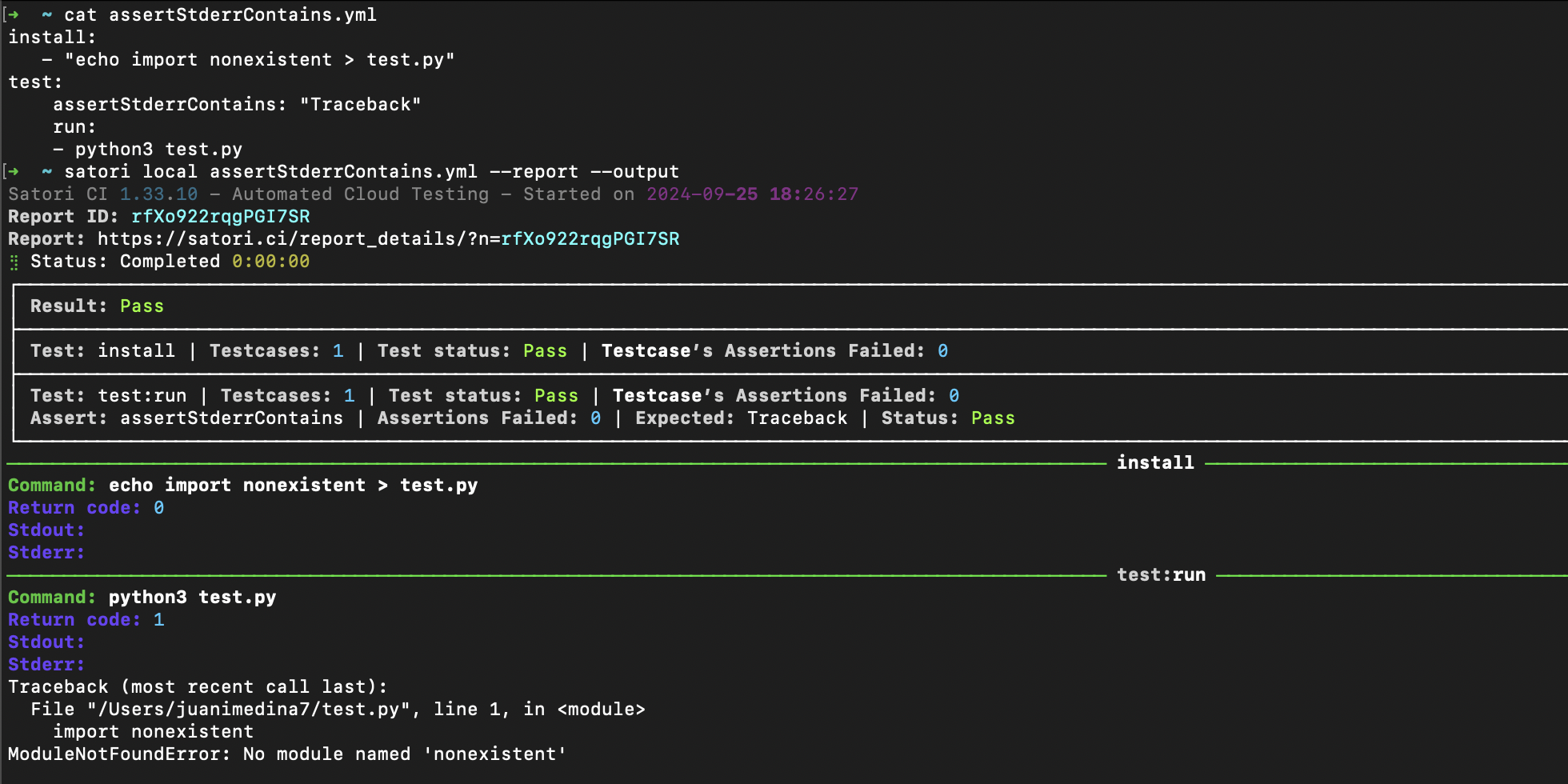
assertStderrNotContains
| Input | Description |
|---|---|
| String | Does the error not contain the String? |
- Example Fail Test: the program's errors should not contain the string Traceback, but it does:
settings:
image: python
install:
- echo import nonexistent > test.py
test:
assertStderrNotContains: "Traceback"
run:
- python3 test.py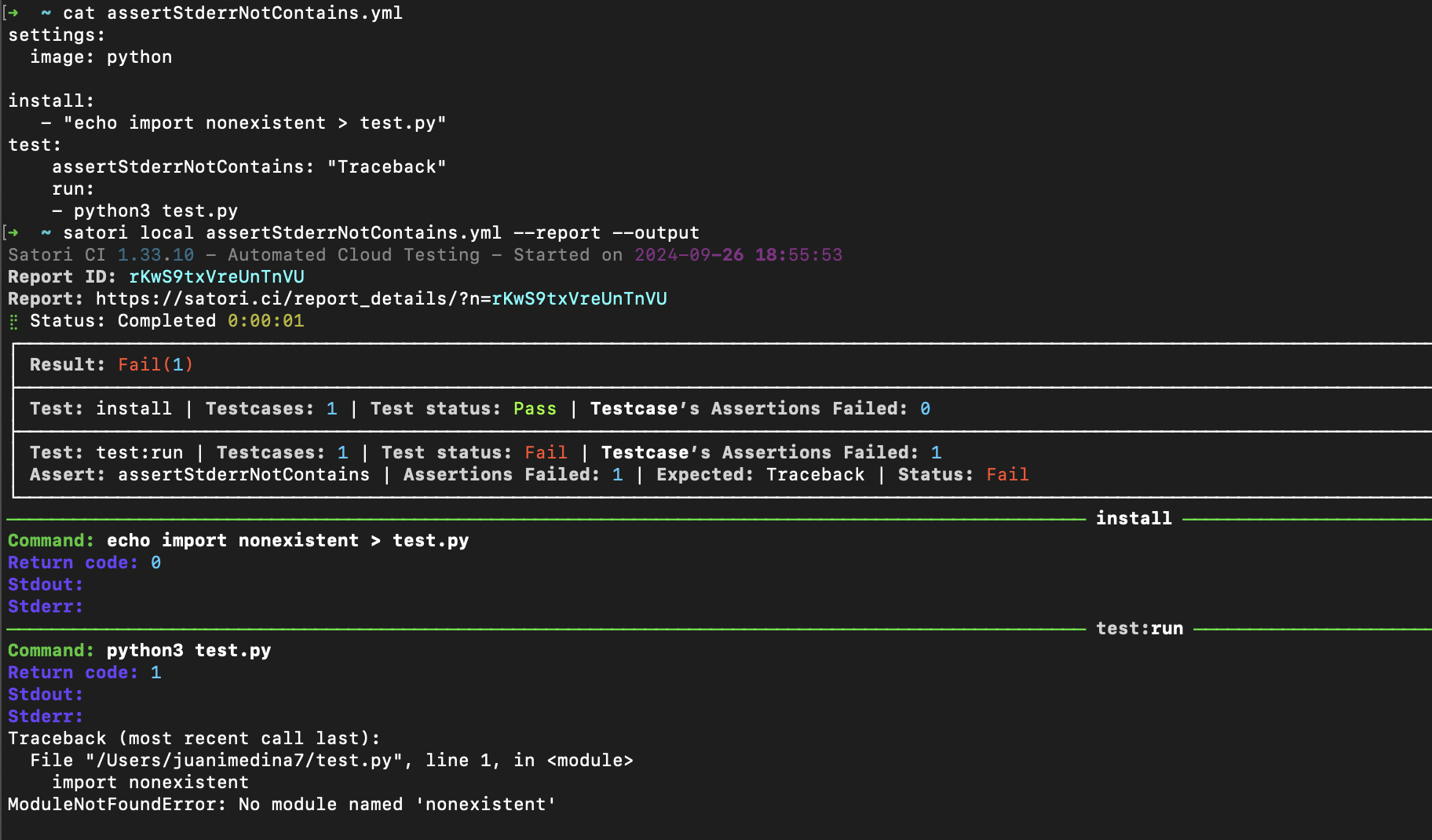
assertStderrSHA256
| Input | Description |
|---|---|
| SHA256Checksum | Is the error equal to this SHA256 hash? |
- Example Fail Test: the program's errors should not contain the string Traceback, but it does:
settings:
image: python
install:
- echo import nonexistent > test.py
test:
assertStderrSHA256: "69827a4c85154b891cae9c35d99887375d815ec676bb7ce86e1f7601f6fec3ad"
run:
- python3 test.py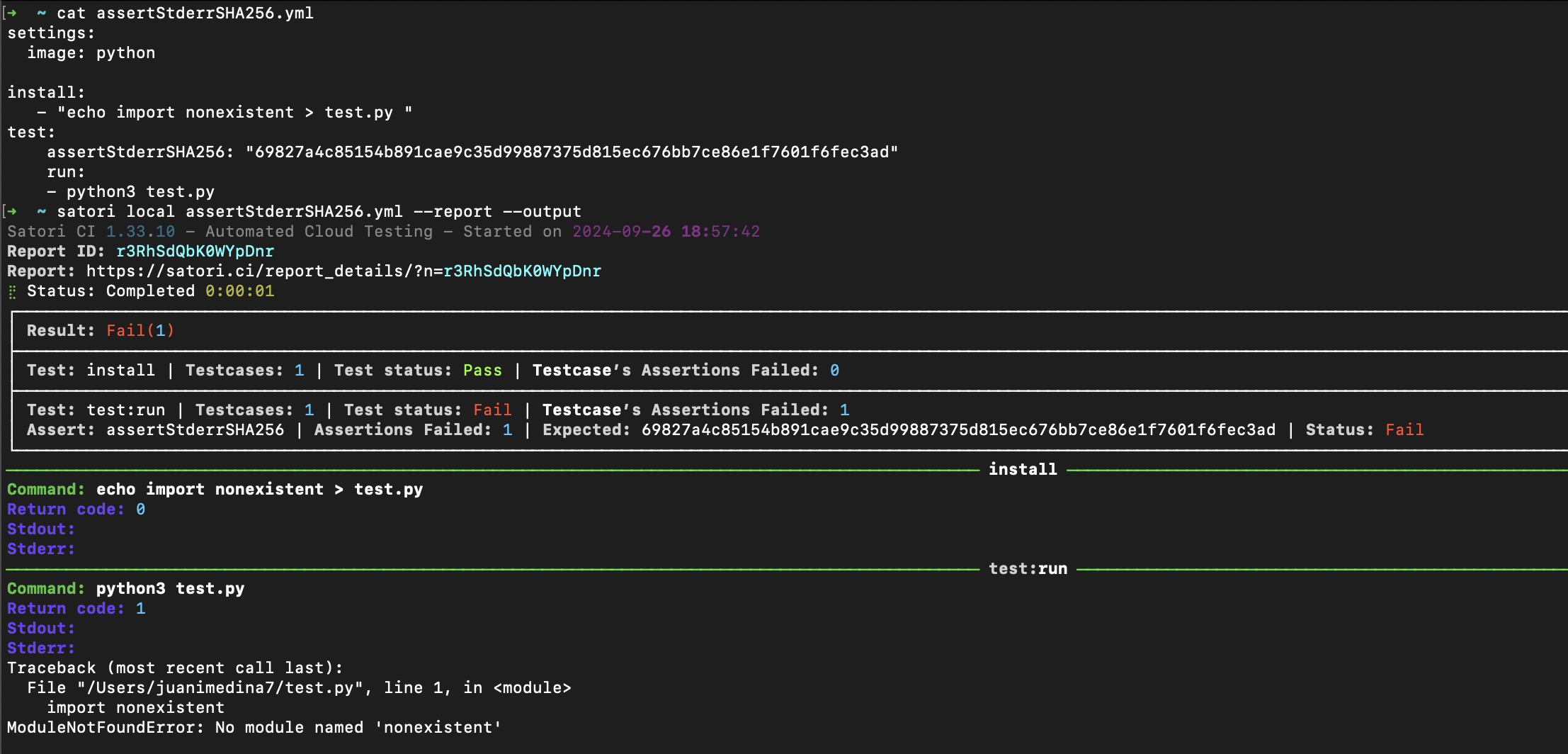
assertStderrRegex
| Input | Description |
|---|---|
| Regex | Does the error match your regular expression? |
- Example Pass Test: the Python script referencing a non-existent object will throw a
NameError:
settings:
image: python
test:
assertStderrRegex: "(?i)error|warning|traceback|exception"
python:
- python3 -c "non-existent"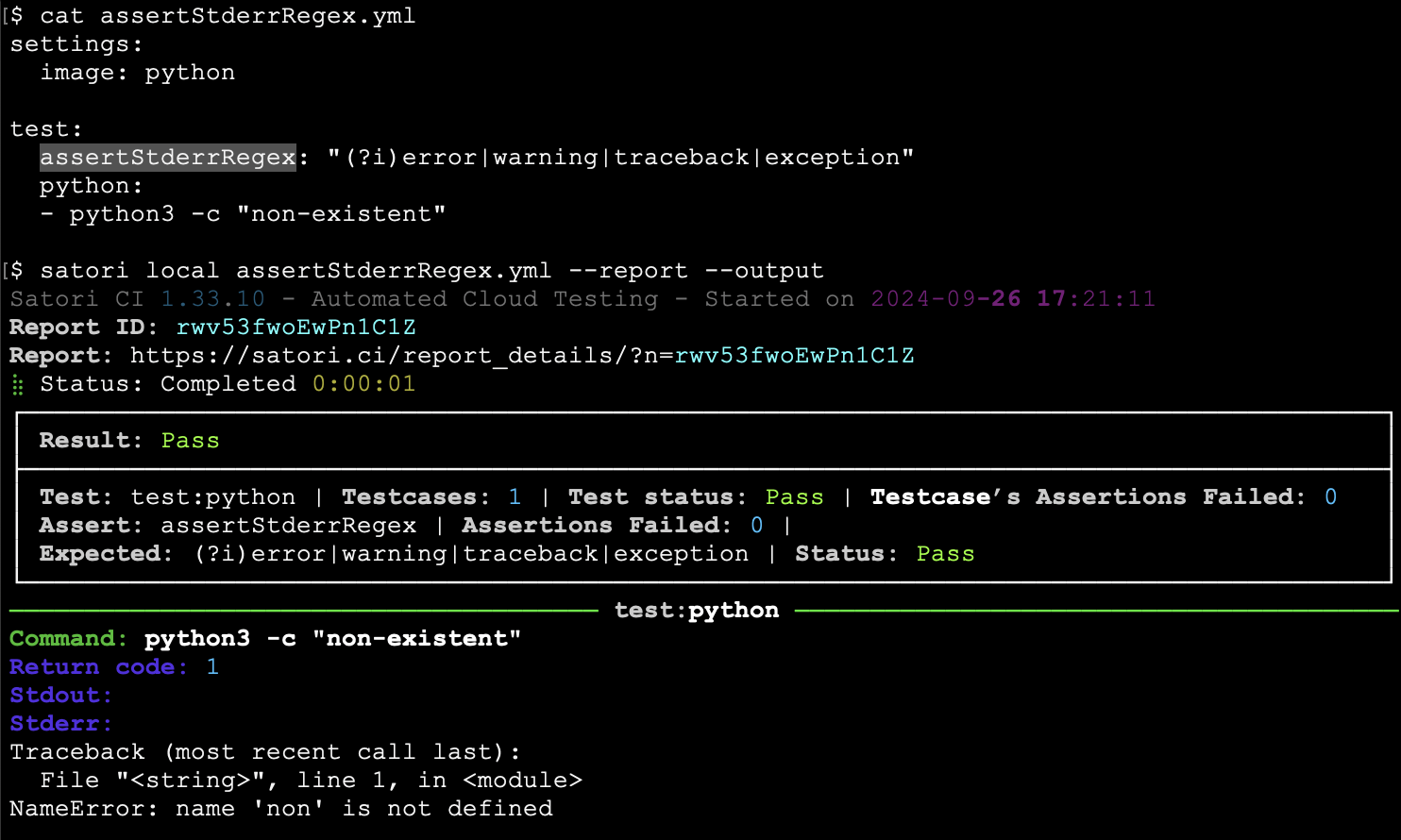
assertStderrNotRegex
| Input | Description |
|---|---|
| Regex | Does the error not match your regular expression? |
- Example Pass Test: the program's errors should not throw a Traceback, and it doesn't:
settings:
image: python
install:
- echo import os > test.py
test:
assertStderrNotRegex: ".*Traceback.*"
run:
- python3 test.py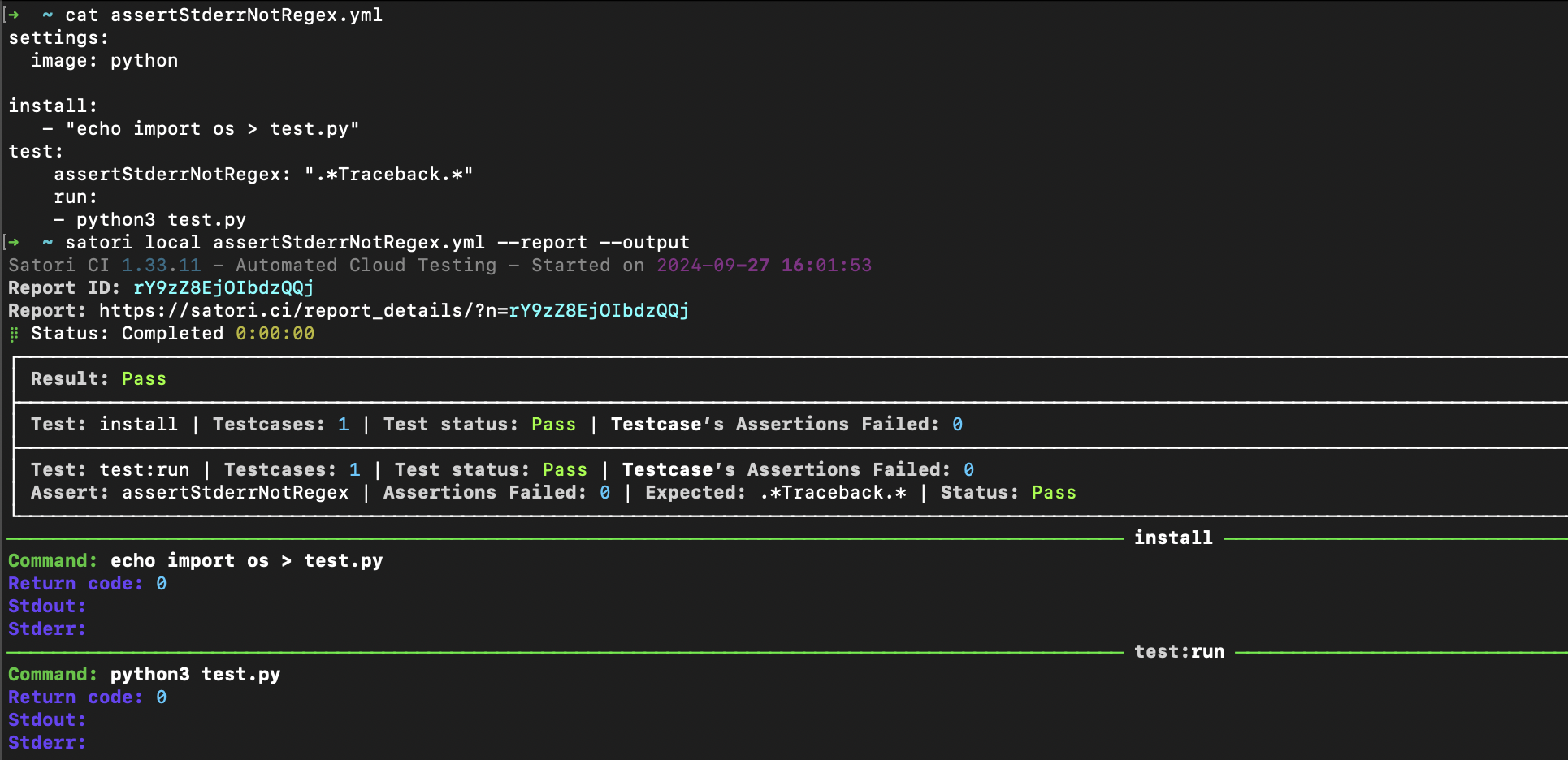
assertReturnCode
| Input | Description |
|---|---|
| Integer | Is the return code equal to the Integer? |
- Example Pass Test: the program should return the code 0, and it does:
test:
assertReturnCode: 0
run:
- echo This program is executed correctly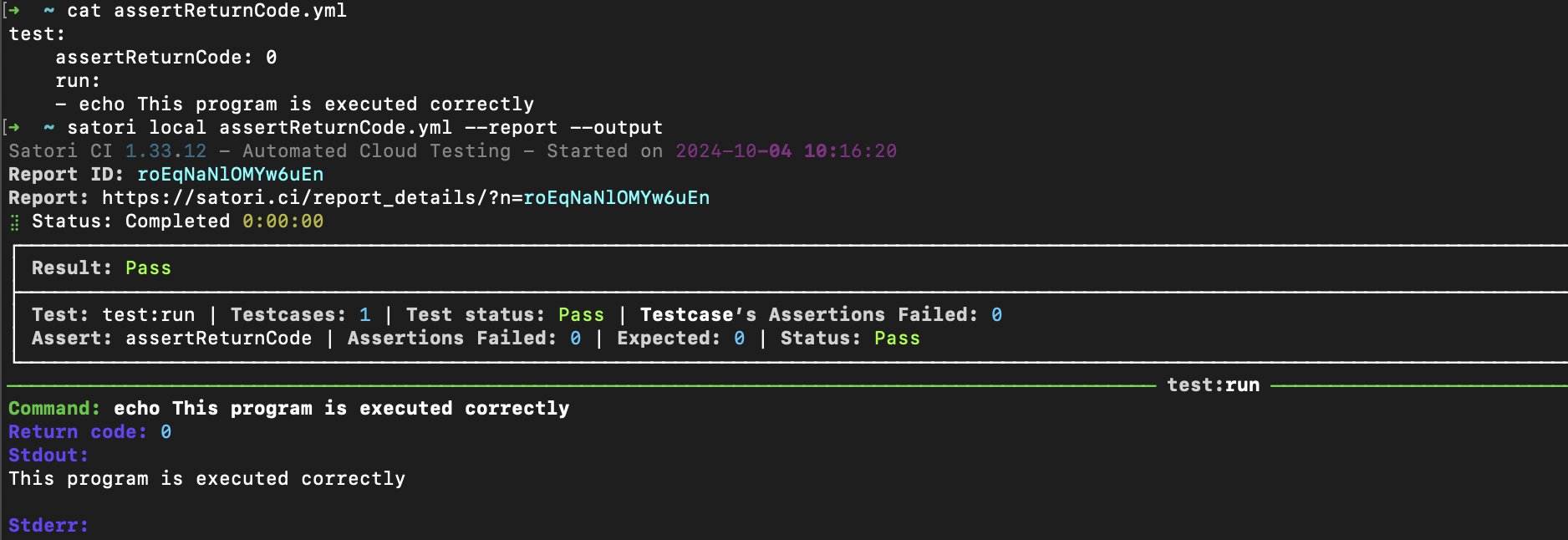
assertReturnCodeNot
| Input | Description |
|---|---|
| Integer | Is the return code not equal to the Integer? |
- Example Positive Pass Test: the program should not return the code 0, and it doesn't:
test:
assertReturnCodeNot: 0
run:
- return 2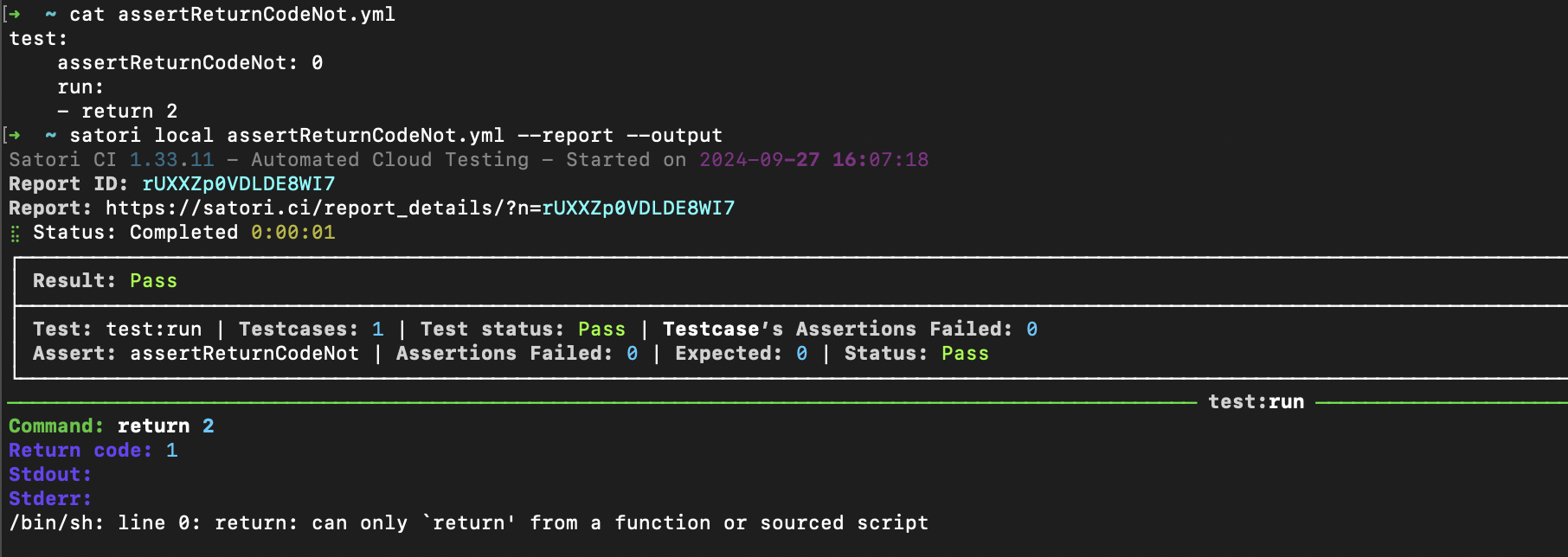
- Example Negative Fail Test: the program should return a code because it can be executed:
test:
assertReturnCodeNot: null
run:
- non_existing_softwareTBC
assertDifferent
| Input | Description |
|---|---|
| Boolean | Does the execution behave differently when using different inputs? |
- Example Fail Test: the production and staging environment should look the same, and it does not:
API:
- - "www.example.com"
- "staging.example.com"
test:
assertDifferent: False
run:
- curl $API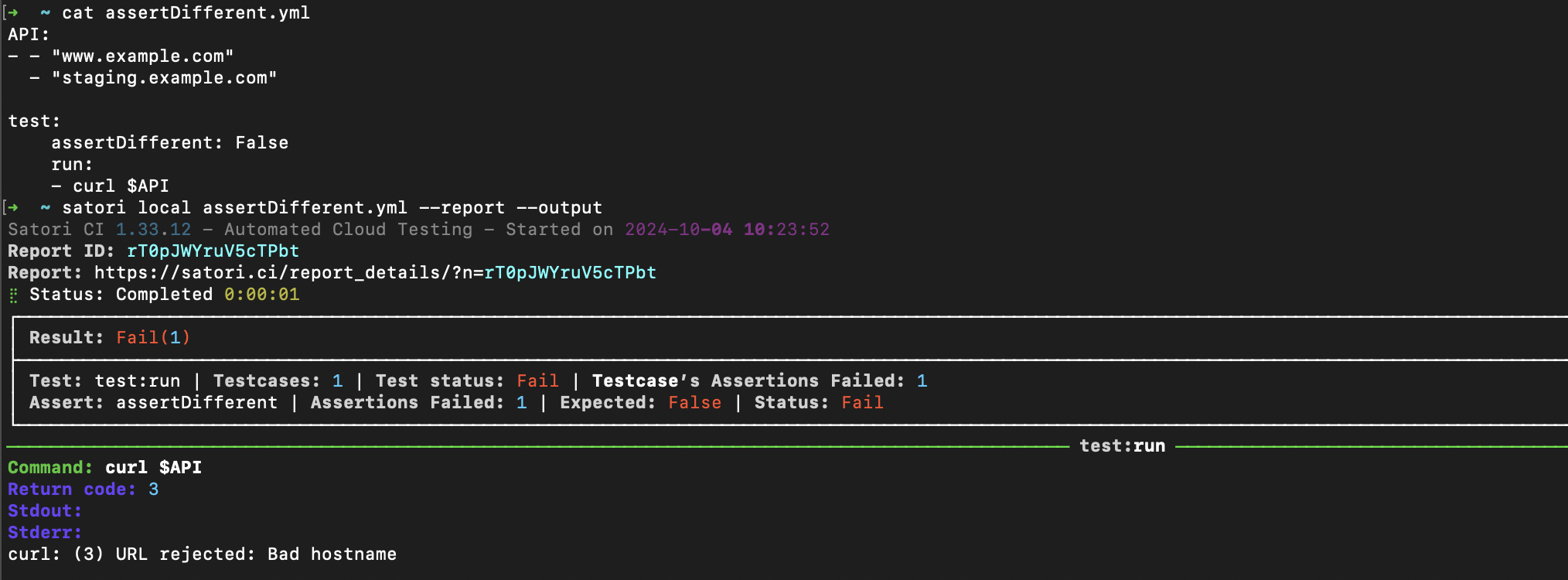
assertKilled
| Input | Description |
|---|---|
| Boolean | Did the software time out? |
- Example Fail Test: the software should finish execution within 10 seconds, and it does not:
settings:
timeout: 10
test:
assertKilled: False
run:
- sleep 20TBC
If you need any help, please reach out to us on Discord or via Email
